200 Pounds Beauty: South Korea’s Plastic Surgery Industry
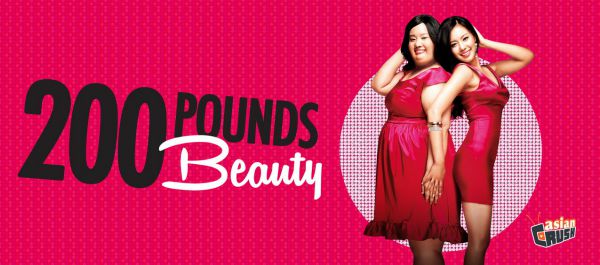
200 Pounds Beauty is a 2006 South Korean film directed and written by Kim Yong-hwa that follows the life of Kang Han-na (Kim Ah-joong). Frustrated by her misfortune because of her physical appearance, Han-na decides to use desperate measures and do a full-body plastic surgery to pursue her dreams. Although it is a romantic comedy, 200 Pounds Beauty dives into deeper issues about South Korea’s society, as the film probes with the idea about South Korea’s obsession with beauty. It may sound drastic to change one’s whole appearance, but in South Korea, there is a correlation between beauty and opportunity.
Using 200 Pounds Beauty as an example, let us explore South Korea’s plastic surgery industry, and how South Korea dominates as a plastic surgery nation.
Plastic Surgery in South Korea
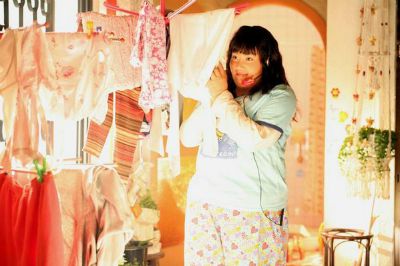
Meet Kang Han-na. Han-na is an extremely overweight woman that is a ghost singer for the popular singer, Ammy (Ji Seo-Yun), and a phone sex operator. She has a wonderful voice and dreams of becoming a singer, but is not attractive enough to be considered. She goes to her friend, Park Jeong-min (Hyeon-sook Kim) for advice, but unfortunately receives the cold truth. Jeong-min says, “There are three types of women for men. Pretty ones – they’re a treasure, The average ones? We’re a present. You? A reject. Get it now?”
After getting conned by her ex-boyfriend and being called a ‘turn off’ by the producer, Han-na’s self-confidence has plummeted. She believes that she will not be happy until she changes her looks, which results in her blackmailing a plastic surgeon (who happens to be her customer) into giving her a complete makeover. Plastic surgery may sound drastic, but in South Korea, it is a common solution for one’s unhappiness with physical appearance. Before we begin, the translation of the Korean characters, 성형수술 , means ‘cosmetic surgery.’ According to Merriam-Webster, cosmetic can be defined as improving one’s physical appearance, such as using makeup to enhance one’s features. Therefore, rather than saying that it looks plastic or ‘fake’, South Koreans treat cosmetic surgery as a method to improve physical beauty.
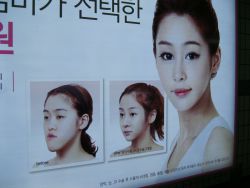
Advertisements can be seen on subways and bus stops for plastic surgery, as these ads encourage young adults with captions such as, “This is the reason celebrities are confident even without their makeup” or “Everyone has done it except you.” 1 High school students are rewarded double eyelid surgery as graduation gifts, 2 and parents encourage their children to get minor adjustments done on their face. This may sound surprising to a Western audience, but it is a common occurrence in Asian countries, in particular South Korea, as between one-fifth and one-third of women in Seoul had plastic surgery. Men make up fifteen percent of the market, and the most common form of surgery is double eyelid surgery, in which an incision is made onto the eyelid to create a crease. 3
For South Koreans, they are desensitized to these advertisements, as it’s just another form of marketing – similar to seeing lingerie models on billboards in the street. However, one cannot deny that South Koreans feel pressured to get ‘beauty enhancements’ on their face, as beautiful K-Pop stars dance and sing on television and promote products. There are also other benefits in plastic surgery, which motivates Han-na to get a full-body makeover in the first place.
Benefits of Plastic Surgery
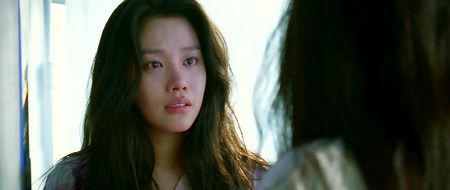
For Han-na, plastic surgery gives her the opportunity to become someone else. Under the alias, Jenny, she is able to get signed as a singer at her old boss’s agency, and becomes popular after her stunning performance of the song, ‘Ave Maria.’ Men are also much nicer to her, as 200 Pounds Beauty’s comedy focuses on Han-na’s naivety, because she’s unable to handle the attention she receives from men. For example, when she is called beautiful for the first time by the car salesperson, she is so happy that she buys a car in terrible condition from him.
It is undeniable that humans are attracted to beautiful things. But in South Korea, there is a heavy emphasis on beauty, because beauty correlates to success. In Patricia Marx’s article, “About Face”, she takes a trip to South Korea to explore this phenomenon. She asks her translator why so many men and women get plastic surgery, and he says, “When you go [to] a job interview, if the interviewer [sees] two [people with] similar abilities, of course he’d go with the better-looking one.” 4

Job applicants must always include a photo in their resume, so there is an extreme bias towards those that are attractive. Eunkook Suh, a psychology professor at Yonsei University, describes an experiment he did with his American and Korean students. 5 Placing down a photo of a person and their description, he asked them which gives them a better understanding of the person. The Americans chose the description, and the Koreans chose the photo. He concludes, “In Korea, we don’t care what you think about yourself. Other people’s evaluations of you matter more.” This demonstrates that while in North America the phrase, ‘it’s the inside that counts’ is countlessly repeated, South Koreans struggle with society’s expectations of beauty versus their individuality.
Therefore, are South Koreans always insecure about their looks? Not necessarily, as every individual is different. However, one of the main reasons South Koreans get plastic surgery is to boost their confidence and become happier with their well-being.
The Ugly Truth
Ironically, despite her full-body makeover, one of the directors asks Han-na to get her nose fixed. This makes Han-na defensive, and state that she does not need plastic surgery. She then explains that plastic surgery is for those who are not confident, and that she is a ‘natural beauty.’ From that point on, Han-na always denies her plastic surgery, and refuses to let anyone touch her. She is unable to properly make out with the producer, Han Sang-jun (Joo Jin-mo), and carefully needs to filter her thoughts when she speaks to Ammy.

There is nothing wrong with getting plastic surgery to build confidence, as it is a choice an individual makes and must be respected. However, many young South Korean girls glamorize the idea of plastic surgery, and think that it will fix all their problems. They do not understand that plastic surgery is… well, surgery, and that pain comes with the beauty. New York photographer, Ji-Yeo, decided to shed light of the healing process through her series, “Beauty Room Recovery”, which shows the ugly and beautiful aspects of plastic surgery. 6 These photos display women with bandages on their faces, sitting in a room as they wait for their body to recover. Unfortunately, marketing does not reveal everything about plastic surgery, as it only focuses on the good results. There have been some instances in which someone’s plastic surgery has gone wrong, hence it’s important to go to a well-known surgeon and understand that any form of surgery has its own risk.
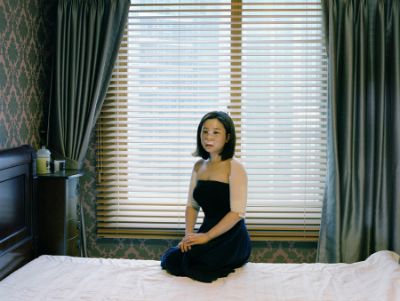
There is also a term for those that get too much plastic surgery called sung-gui, which means ‘plastic-surgery monster.’ 7 This is given to a person who has had so many alterations that they look ‘unnatural and arouse repulsion’. Han-na is first called a monster when she asks her friend if she should confess her identity to Sang-jun. She says she is pretty, but Jeong-min states, “No it doesn’t apply. You know why? Those with plastic surgery aren’t women, but monsters.” This comes as a shock to Han-na, as beauty was what she wanted to obtain when she got her makeover. However, the audience feels empathy for Han-na when Sang-jun rejects her after he realizes that Jenny was the overweight girl that abandoned his company. She is shocked at Sang-jun’s sudden treatment, as she says, “So I’m just a product. Han-na is worthless, but Jenny is worth a fortune. Is that it? … You find me repulsive with plastic surgery? So you avoided me?”
She then proceeds to rip down all the posters of herself in the office, saying that they are repulsive and scary. At that moment, the audience realizes that all Han-na wanted was to be accepted, and she was unable to get it whether she was ‘ugly’ or ‘beautiful.’ Her obsession with beauty warped her into thinking that beauty would fix her life, not knowing that it would destroy her relationships.
Relationships
This brings us to question whether one should be honest if they had plastic surgery. As Han-na has high hopes that Sang-jun would accept her, Jeong-min says, “All men are the same. They say plastic surgery is okay but not for their girls. That’s men.” Unfortunately, Han-na’s naivety hits her with cold reality, as Sang-jun says so himself that he does not approve of plastic surgery. He says, “Why do [women] hide it then? They hate revealing it. It’s a lame self-justification.”

Although this did not happen in Korea, there was an incident in 2013 in which a Chinese man sued his wife for giving birth to an ugly child. 8 The wife confessed that she spent $100,000 on plastic surgery before their marriage, and kept it a secret until the husband questioned her. There are claims that this story is false, but it shocked enough people to circulate it through social media and revive the story in 2015.
Jina Kim, a Korean YouTuber, also decided to interview male Sogang University students about their thoughts on plastic surgery. 9 The men had conflicting thoughts, as one of them said they would try to stop their girlfriend because it is a form of surgery. However, when Jina asked them if they preferred a small-chested girl or one with breast augmentations, the majority picked the latter. It seems even men are confused with their desire, hence Sang-jun conflict with Han-na’s situation.
However, he redeems himself in front of Han-na when he stands up against the president of the company. Enraged at the idea that Han-na told a lie, the president tells the producers to release a nude album of Jenny before the public hears the truth. After breaking a cup and wiping his blood on Han-na’s contract, Sang-jun tells them that the concert will be a success before pulling Han-na out of the room. Of course, romantic comedies have a slight fantasy element in their storytelling, but 200 Pounds Beauty drives home the message that beauty is superficial, and that a person’s character is more important than their looks. This is demonstrated at the end of the movie when Sang-jun states that he likes Han-na even more despite the incident, and gets angry when his coworker asks if it’s because she’s pretty. But as he watches Han-na play with her dog, he smiles and agrees that it is Han-na’s innocence that attracts him.
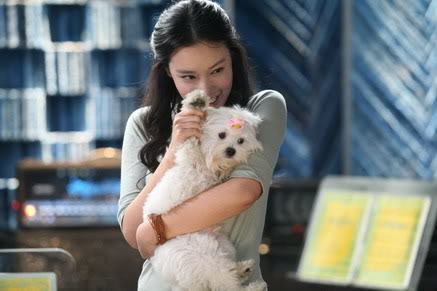
Like most romantic comedies, 200 Pounds Beauty has a happy ending, because after Han-na reveals her identity to the audience, her fans adore her even more for her honesty. She is able to come to terms with herself and learns that it was not her appearance that was holding her back, but her confidence. Although she used plastic surgery to get her results, she did it on the decision to be happy. Ultimately, plastic surgery is a choice, but there will always be a never-ending debate between doing it for self-gratification or doing it under social pressure.
Plastic surgery is a controversial, sensitive topic and one that is not always openly discussed. For those of you that are interested to learn more about this topic, I recommend doing your own research to see how plastic surgery is viewed differently in other countries in order to gain a broader perspective.
Works Cited
- Marx, Patricia. “The World Capital of Plastic Surgery.” The New Yorker. The New Yorker, 23 Mar. 2015. Web. ↩
- “South Koreans Give Gift of Plastic Surgery.” Voice of America News (2004): n. pag. ProQuest. Web. 9 Mar. 2014. ↩
- Marx, Patricia. “The World Capital of Plastic Surgery.” The New Yorker. The New Yorker, 23 Mar. 2015. Web. ↩
- Marx, Patricia. “The World Capital of Plastic Surgery.” The New Yorker. The New Yorker, 23 Mar. 2015. Web. ↩
- Marx, Patricia. “The World Capital of Plastic Surgery.” The New Yorker. The New Yorker, 23 Mar. 2015. Web. ↩
- Swanson, Ana. “Stunning Photos Show Why S.Korea Is the Plastic Surgery Capital of the World.” Washington Post. The Washington Post, 16 May 2015. Web. ↩
- Markkys. “Korean Plastic Surgery Monsters.” Korean Plastic Surgeries. WordPress, 26 Mar. 2015. Web. ↩
- “Man Sues Wife Over Ugly Children.” Snopes.com, 15 May 2015. Web. ↩
- Itsjinakim. “Ask Korean Guys: Dating Foreigners, Plastic Surgery & Beauty Standards” Online video clip. Youtube, 12 Dec 2014. Web. ↩
What do you think? Leave a comment.











It would be really Ironic is the actress herself actually had plastic surgery.
I have watched this movie over a year ago. I read an article on koreaboo.com which is a site on pop culture South Korea and it said that the actress did have plastic surgery in real life.
i live in korea and can attest to the fact that how good someone looks is directly associated to their value in society. when applying for a job in korea, one is directly assessed based on their looks and wealth. we have to give a recent picture on our job applications, and, more often than not, one’s picture is more relevant than one’s qualifications. i graduated from a very good school and i was passed over for a job for someone that went to a low level school and who graduated with grades not good enough to get into teacher’s college in canada. im not knocking canada, but simply stating (from experience) that good looks and wealth can get you anywhere in korea.
don’t get me wrong, i know it’s the same everywhere. but it’s magnified in korea. look up the concept of “culture lag”
every country had its foibles – this is just an extreme one.
I can’t imagine attaching a picture of myself to my resume. I’d much rather be judged on my accomplishments and whether or not I’m a decent person, but we judge people first on how they look and draw our own conclusions based on that.
Very good article, and the movie sounds like a must-see! I watched a documentary on this very subject and it is stunning how an advanced country like S. Korea can have such a dark overbearing situation (or perhaps it should be expected from richer cultures). One wonders how humanity will develop in the future with such emphasis on beauty as defined by advertising.
Very interesting article on a topic that not a lot of people are aware of, especially in so-called ‘Western’ countries. Thank you for this very enlightening read!
So… I’m really pleased to find a reading of 200 lbs and I think your connection between the film and broader Korean society is spot on, but, I’m concerned with the moralistic overtones that shape the piece. Your use of the word obsessive bothers me and it makes me wonder who the audience is of your piece and which dominant culture you’re responding to–a Korean one or an American perception of Korean surgery. Thank you for posting.
Thank you for reading! Since I live in North America, I can only write this from an outsider’s perspective and use the research I found and sourced from the Internet. I’ve never been to South Korea, so those living there might have their own perspective, but I wrote this article to enlighten people about the p.s industry in another country. Sorry if my words offended you!
The ending failed miserably.
I was in a showing full of Korean girls when I saw this (I’m a white guy), and apparently it’s a very well known film in Korea. They were chatting and laughing at the parts they knew and everything, not unusual for Asian girls in a big group together.
Certainly these girls and perhaps Korean moviegoers, as a different culture, didn’t think that far with this and just liked it for the reason people in America see mediocre comedies all the time. It’s a good movie in terms of execution and the comedic parts were really funny, and I would have enjoyed it if it had had a less hypocritical ending.
Beauty is in the person’s character and their actions – but people care about those things ONLY if you’re beautiful on the outside FIRST.
I don’t understand why people think plastic surgery is wrong. First of all, we are not born equal. Some people are smarter than others, more athletic than others, more talented, better looking, etc. That doesn’t mean we have to stick with what nature gave us. Why shouldn’t we try to better ourselves, if that’s what we want? I hate the whole “natural is best” argument. Natural is not always the best. What about the kid who is born with some sort of deformity that can be fixed through surgery? No one looks down on her for wanting to change what nature gave her. Perhaps one might argue that plastic surgery is not something you need in the same respect. Well then, what about laser eye surgery? Clearly something you don’t need (with some exceptions perhaps, but generally speaking), as there are glasses and contact lenses available. Yet the person who gets Lasik is not perceived in the same light as the person who gets a nose job. Looks are very important–it is the first impression that one gives, and its influence is so subtle and powerful that only the blind are immune from this bias. I’m not saying this is bad or good, just that it is an intricate part of human nature: We respond more positively to beauty. I have several friends in business who got their jobs over better candidates because of their looks. They are qualified as well (obviously you can’t be a total idiot), but strictly by paper, some of them should not have been picked.
Anyway, my point is, beauty is not everything, but it is a pervasive power. It is completely feasible that a nice girl who becomes beautiful can lead a happier life than when she was fat and ugly. The movies that show the unattractive girl being happier in her original state are simply being politically correct, the whole “See how idealistic, moral, and unsuperficial we are” spiel. Not that I’m saying such a story is improbable, but it’s refreshing to see a movie that is more realistic about society, where beauty does bring happiness because, in reality, it usually helps a lot.
Hayward,
No one said plastic surgery was wrong, she simply made a point to speak about the pervasiveness of the South Korean plastic surgery industry and it is a booming one. Seoul is now the plastic surgery capital of the world. A large portion of it is devoted to medical tourism, with tourist coming to Korea specifically for procedures, and many doctors and clinics providing certificates guaranteeing these people to show to airliners and agents when they try to return home and their passport pictures no longer match their faces.
If a person has the money and they believe that it will enhance their self esteem to get it done, who cares? But the issues are far more reaching than that. With 20% of S. Korean women getting procedures done compared to only 5% of Americans, what does that say about the pervasiveness of looks compared to character or ability? What message does that send to a young woman as she is growing up?
Another problem in S. Korea is that there is a specific standard of beauty that is leading to a type of Stepford Wives syndrome, where women are losing their individual features and are becoming glass clones of one another. All in the pursuit of the “ideal beauty” look.
You spoke rather callously about a woman being “fat” and “ugly” being unable to lead as happy of a life than a nice girl who is skinnier. Who are you to dictate another persons happiness? Why does a woman who may not meet your “ideal” and I use that term loosely here, immediately become unhappy because you or I’m assuming you’re implying “society” doesn’t find her attractive? Rather one sided don’t you think? Women are only suppose to be beautiful, fit, young, ? That’s beyond ridiculous and a very one dimensional mentality.
Movies like this send a horrible message to the audience. For females, it gives weight to the notion that a female is only worth as much as her appearance. For men, it perpetuates the notion that women are accessories that can be traded in at any time past her sell by beauty date.
You never know if the grass is actually greener until you’ve been there.
Plastic surgery cannot solve everything.
Is South-Korea that superficial, that’s crazy, but I guess it’s the culture.
This movie contradicts itself. It tries to portray the message that plastic surgery can’t solve anything, yet she got everything that she wanted after having the operation.
We human being are bound by the perception of eye candy. That, it’s hard to find someone ugly attractive despite his/her kindness. But, with a little help from plastic surgery, you can see the beauty inside a person without being distract by his/her look. Overall, the movie tell us it’s OK to had plastic surgery, but it can’t give you something you don’t had already.
Great film with an interesting message about society.
Yes you do get paid more attention to if you’re pretty. You’re not going to make it as a singer unless you’re good looking (Korea or North America). It is true that we pay more attention to more good looking people.
Koreans respect “natural” beauties more than “artificial” ones, but I think this attitude is stupid.
The movie was touching that I cried at the ending!
I heard that for their 18th birthday, it was common for Koreans to be given money for double eyelid surgeries by their parents but that’s awfully far! A child shouldn’t be on a diet– that’ll stunt their growth!
In some scenes, the movie is acting like cosmetic surgery is a good thing, perhaps this is because the writers grew up and live in an environment that says exactly that!
But still, the movie also does talk about how the surgery’s not gonna do it all, e.g. with the antifans and how Hanna wasn’t happy until she confessed.
And to those who stand by it’s condoning plastic surgery by giving the movie a happy ending.. maybe its because they wanted to make a lighthearted happy movie that ends with the ‘fat ugly girl’ actually achieving what she wants.. it’s a nice ending. I’m happy with it, much happier than I could be with an ending that resulted in Jenny going down, Hanna staying down also and her plastic surgery bits slipping out of place.
The movie was a commentary of how shallow Korean society is and its obsession with plastic surgery.
How people won’t treat you as a humab being if you are unattractive. I know every society is like that but I think Koreans take it to another level.
Interesting read. I’ve been meaning to see this one for a while. It’s back on the watchlist 🙂
Ok, I’m going to sound like a real f@#K-head here, but I’m sick and tired of the all this people saying that being fat and overweight is ok!! Its not fraking ok is unhealthy, I’m not saying that people should go and have a plastic surgery or a crash diet either that just too extrem and dangerous. But all this idea in the west of its ok if your fat is just plain stupid, just because the US have a overweight problem they too lazy to fix they came up with its ok to be fat thing. I heard that when the Nutty Professor came out in the US there was a group fat ppl complaining that the movie poke fun at fat ppl and a call to boycott it. WTF??!! They even form an association of fat ppl in the US??!! Why don’t you people just excerise and stop eatting so much Mcdonalds!!
As someone who has lived here for four years I can assure you the reality of life in South Korea is much more harsh than the movie. They are addicted to plastic surgery and treat anyone even slightly “imperfect” as subhumans. That goes for skin color, too. People checking their faces in any shiny surface available, 24 seven. Little emaciated kids put on needless diets by their selfish mothers. Forget that job at Samsung or LG unless you get a few ribs removed. Appearance has completely replaced intelligence, creativity and productivity as criteria for most jobs. Yes, plastic surgery can, and does solve everything – If you live in South Korea. You’ve got to see it to believe it.
Why single out just Koreans for being shallow? When it comes to cosmetic surgery, surely they’re still catching up to, say, the Americans and the Japanese, who after all have had the cosmetic surgery bug (with the requisite specialist surgeons and the disposable income) far longer.
I live in Los Angeles, and I can attest that parents here do give their teenage daughters nose jobs and boob jobs for their birthdays, and mothers do put young daughters on needless diets. And of course, ‘imperfect = subhuman’ is the quintessential formula that drives the entertainment industry everywhere. Let’s not forget either, that when it comes to rib-removal, corset-wearing Western women led the way generations ago (in both cases I’m inclined to think it’s just an urban legend — still, I’ll admit I don’t really know). And as for looks being more important than brains in some jobs, that’s just business as usual everywhere, including wherever it is this Korea-basher hails from.
This article wasn’t intended to ‘bash’ on South Korea – I wrote it to give people perspective on p.s industry from another country. I’m sorry if this is how you perceived the article.
beauty is in the persons character, and their actions; not their looks. Personally, I liked Hanna more as she was before than after the surgery– so I can understand the reaction of most people around her.
Her REAL beauty did not surface until after she admitted to be Hanna, in public, and the people saw who she really was (as a person). I had to cry at that scene. The delivery man had to cry too: also in his eyes, this made Hanna 10 fold beautiful: not just on the outside, but now also on the inside, for she really understood how he felt.
Nicely said! The ending was really emotional for me as well, since it takes a lot of courage to admit your insecurities in front of a large crowd.
I think that this was a good movie with some laughs and a positive message. I felt so bad for Hanna when she was in the bathroom near the beginning.
I don’t think it was a good message. It was more like a “real” message of what happens in their country, especially in the entertainment scene where most artistes go by looks & lip-syncing is just part & parcel of the scene for success.
The part where Jenny was asked to go for another plastic surgery? I think it’s a deliberate mockery of artistes who deny having plastic surgery but are later exposed to be doing so. This might seemed queer in Hollywood where most stars will admit to getting their body fixed but in Asian context, most people will still prefer to know or rather be “deceived” that the beautiful stars they see on screens are all-naturale beauty.
Yup, so it’s a sad game of exposing lies & hiding behind the fluff of what looks good & beautiful.
Ah, I heard this film was great.
It is true that Korea really emphasizes that market.
I Read a story about a man & his wife bearing a child. However the child came out “ugly” and then he sued his wife for lying about her surgery.
I mentioned that in the article! However, there are claims that the story is false. It does stir up discussion though, as many people were shocked by it.
And America’s not shallow and accepting of people of all sizes? Talk about the pot calling the kettle black.
the really awesome part was how in the end… they said that hannah had more “anti-fans” than she ever did when she was jenny. this movie did very well in conveying such a complex issue in a light-hearted and understanding manner.
A really interesting article, that confirms my ideas about how South Korea treats its people (generally). Another great topic to dive into could be gender roles in Korea, you’d be surprised at what you learn.
For me, another striking part is (and this is also relevant to Japan), the demand coming from the patients are mostly for their eyelids and/or noses. I have read an article, sadly I cannot cite it now, shows before and after photographs of the patients and you can clearly see that their racial characteristics have vanished and they look more like a ‘Westerner’. Okay, the beauty has a standard but it also has a racial standard too and that is Western beauty. Not being happy about how your nose looks is something but having problems with racial characteristics is another. I think it is also visible in the captions you added in your post.
Thanks for sharing!
This is exactly what I was wondering when reading this article as well. I’m curious as to how Western beauty standards complicates this discussion of plastic surgery in Korea. I know that many of these advertisements also depict women with paler skin and advertise products for this, too. I wondered too if there was something to the fact that the plastic surgery seems to make the character in the movie more Western–for example, her name change from Han-na to Jenny. Just a thought.
Great article, glad it was shared.
This is a well-researched article and eye-opening for those who are unaware of the South Korean obsession with beauty. I think we all should be careful when evaluating the practice of another country not to overlook our own similar practices. While it is true cosmetic surgery thrives in South Korea like nowhere else, America made plastic surgery popular with our breast enhancements and face lifts. At least as many American celebrities as KPop stars have had cosmetic surgery in the form of lipo-suction, breast enlargement, nose reduction, or a face lift. As a result, many American women now question their size as well, and plenty of American men evaluate women according to unrealistic standards.
The whole world is obsessed with beauty. South Korea found a way to capitalize on it. There is nothing morally wrong with that. The sad part is that Koreans feel the need for double eye-lid surgery at all. They shouldn’t feel pressured to have wide or “Western” looking eyes, as this perpetuates negative body image of an entire culture more so than their cosmetic surgery marketing techniques.
Thanks for posting!
This topic is indeed interesting! I think the real issue of plastic surgery stems from the concept of self-acceptance. If Han-na accepted her former self, she would not have gone under surgery. I think the major twist that made the story have a happy ending is that the guy met the Han-na way before her surgery and was already attracted to her. This is perhaps the reason why he still accepted Han-na after he discovered what she did. This makes the case different from the incident in China. The guy never knew the girl before hand. So I guess it was harder for him to accept the truth.
This system is a cage that fetishizes fascism and tranquilizes creativity.
Plastic surgery can’t solve everything.
This is interesting, I’d like to see it. But I am not as shocked being from America, I think plastic surgery is really starting to gain in popularity quickly. Unfortunately what people don’t understand is plastic surgery might help on the outside but its the inside that needs work. If you don’t like something about yourself and you “fix it” with plastic surgery likely you will find something else to not like, and so on until you explore why you are insecure in the first place. I think what needs to change is the pressure that is put on girls to be perfect in all cultures it starts at such a young age, all we see is what we “should” look like from TV, advertising , etc. Its damaging to grow up being told you should not only look your best, you shouldn’t age, you should have x amount of children, you should have a successful job, husband, etc its exhausting. Some people claim 30 is “old” for a girl but young for a guy why is that? – These ideas need to change world wide.
It does seem to me through the article (I haven’t had the chance to watch the movie yet) that while the film does try to shift the mentality of its audience to one that emphasizes beauty less than inner character or achievements, I found that more complex (or rather, confusing) dynamics are at play here which the film may not have had either enough weight or time to explore.
I thought the point raised about how men seem conflicted about their desires is very poignant and curious, and certainly warrants deeper understanding and interpretation in order to have a more solid understanding of what’s at stake in the high prestige placed on beauty.
What might have been the cumulative source of these ideals in South Korean society? Considering how plastic surgery appears to be a quick fix, it must surely fix a problem, and the problem must have had its source, one pervasive enough for 20-30% of South Korean women to have done some form of plastic surgery. It seems like there is a tension between aesthetic beauty and the desire for that beauty to be pure, natural, authentic. Could this signal clashing values in South Korean society and where may have these emerged from?
Hope that someone with a better insight to South Korean society can shed light on some possibilities!
I always appreciate writers who take the time to write about cultural/controversial issues and differences, even if coming from an outsiders point of view. Now I am curious to see this movie!
It’s interesting to see the different directions (even if they’re only perceived directions) South Korean culture and American culture are going. I wonder if body shaming is common in South Korea because of these standards?
This is a sad reality in some Asian countries like South Korea as it mentioned, and the physical appearance does unfortunately have close connection to the job opportunities. The truth now is when you are walking on the street in Soul, you will run into so many similar faces because all these girls have had done certain cosmetic surgery and the common view towards “beauties” is alike ( for example sharp chin and big eyes). And it does seem to be a truth that if you are a gook looking, you will get higher chances to be hired and even liked by your supervisors, and it drives so many even average looking girls to do the surgery.
Interesting topic! It’s confusing to me that people act shocked at reading about such “extreme” views re: beauty and enhancements in S. Korea and other locations. Judgment and mistreatment based on appearance occur all over the world. In the U.S. we may not attach photos to all resumes, but appearance certainly matters in job interviews. Fat-phobia is extremely present in American society, especially in the workforce. To say that there is less focus on beauty or “acceptable” appearance in the United States is bogus.
This is a beautiful way to explain an issue the author finds in Korean society. This movie, though a work of comedy, expresses a true issue that is going on. The extreme need for beauty leads people to spend thousands of dollars just to feel accepted by their peers.
S. Korea does have an interesting relationship with beauty. On almost every corner is different brands of skin care lines: Innisfree, SkinFood, Olive Young, Nature Republic, etc. In the more affluent parts of Seoul, not only are there skin care shops but plastic surgery clinics. It is not uncommon to see a person in bandages and sunglasses walking around Garosugil while shopping.
In terms of Korea’s history, just recently has Korea had a boom to their economy, and I think their prominent beauty and skin care developments have aided in this. With this, I think Korea is facing an interesting culture shift–Korean traditional, historical values mixing (and sometimes clashing) with new Western-influenced values.
I think to judge Korea on their values of the physical is hypocritical because there have been influences of western culture that play a role in the development of this. (I.e. post-colonialism and US’ influence on Korea)
Yes, Koreans have many skin care and plastic surgery clinics. The availability of these are astounding, but it’s also a part of their economic success. They say don’t judge a book by its cover, and I think the same goes for Korea.
I think it can be hard, from a European or American perspective, to understand how far plastic surgery is normalised in South Korean society. Girls will often have ‘double eyelid’ surgery in the summers between the years of high school or the transition from middle school to high school.
I have heard that individualism in South Korea is not as prized as it is in other countries. Whereas to be artistic or creative is admired by some, in Korea, to go to Art School is one of the lowest schools to attend when ranked ‘socially’ [i.e. if you were dating someone it wouldn’t be particularly desirable for your significant other to have gone to art school]
And whilst this is, inevitably, changing with Korea’s adaptation to further outside influences and its burgeoning modernisation, perhaps plastic surgery is another way for people to ensure that they ‘fit the mould’ – only in terms of aesthetic appearance.
Interesting article!
One of the hardest things about watching foreign television is that it’s about as real as any television: far from the truth. Just looking at American television, life here is rarely anything like that. Certain social constructs and ideas that are commonplace will find their way in, but it isn’t always the norm. In the case of cosmetic surgery in South Korea, yes, it is commonplace, though I’m sure there is a portion of the population that is still not comfortable with viewing cosmetic surgery as a good thing.
The thing is, if we don’t live in South Korea, if we do not live in the culture, abide by the culture, and understand the culture, we cannot pass judgement on their culture. Compare it to any social hot topic in your country. What does the majority of the populace think? Other countries may disagree with that point of view and while other countries might agree that it’s. It is the same with cosmetic surgery in South Korea. Just because it is different from our culture doesn’t mean it’s incorrect.
I remember watching the movie and thought it was well made for something that tackles some fairly complex subjects in a deceptively light-hearted manner.
Sounds really interesting.
WOW this is fascinating. Great read! I’ll check out the movie, too
Really good read and interesting to learn what different cultures value than others.
I watched the movie, although it was funny in some parts, it does raise the issue of plastic surgery and surviving the culture. Although I have South Korean friends, I didn’t come across this topic before reading this article. So, thank you so much for writing this article!
Natural beauty shouldn’t be a curse that only leads to plastic surgery. Plastic Surgery for cosmetic reasons is a huge deal in South Korea due to the ideal, perfected look. No one should feel so much pressure from society to change the way they look to the extreme that makes them a whole different person on the outside.
Wow this was such an interesting and shocking article. Now I want to track down that movie and watch it – is it available in an english subtitled format anywhere? At the beginning of your article my immediate thought was, “Well, in the West there is a focus on appearance and plastic surgery as well”, but it sounds like in South Korea it is a whole new level of extreme. This is why I find cross cultural differences so interesting. It’s like all over the world we are one big human behavior experiment, and the social consequences are the results of emphasizing particular aspects. In Australia it is possible to get private health fund rebates on plastic surgery so long as it is for a medical and not vanity reasons (reconstructing the body after an accident and I think removing loose skin with weight loss comes under this as well) – does the private health insurance in South Korea work in a similar way? I’m not sure if you’d have the answer to this but it’s very interesting. Thanks for the article.
Hello, I’m not sure about the answer for the private health insurance, so I would have to look that up. But as for the movie being available in english subtitles, I did watch it online so it’s out there somewhere! You’ll just have to do a google search.
Thanks a lot, I’ll see if I can find it legally on a streaming website.
I personally love this movie. It was well directed and I loved the script. I think that now plastic surgery is so prevalent that the netizen (public) praise people who do not get plastic surgery. For example, park so dam is not that pretty but people love that she looks different and people keep commenting that she shouldn’t get plastic surgery if she wants to survive in the industry.
I absolutely loved this movie and will always be a re-watch for me. Even though the film’s notion of supporting plastic surgery doesn’t seem like a positive message, especially with the main character becoming very pretty and only able to win the man’s heart this way, I think the theme of identity in the film is even more important. When the main character wasn’t happy with who she had become after changing her outward appearance and sang the song of her first audition with the video playing in the background, that moment really made me love the film and made it a favourite for me.
Great article! It breaches the topic with a neutral opinion and is clearly unbiased towards or against plastic surgery, it simply discusses it’s value in South Korea and weighs the pros and cons of it. Great work!
Yeah plastic surgery is good way.
Sounds like an interesting movie that reveals a few cultural tensions, that also are integral to the plot. Very realistic.